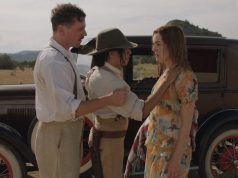As the patron saint of cinematic hipsterism, writer-director Wes Anderson is known for making films that, even when set in the present day, have an aura of timelessness about them. The dialogue may be arch and modern, but the diorama-like sets and symmetrical shot compositions suggest the formality of a bygone era — possibly one that never actually existed.
That out-of-time feeling has never been stronger than in Anderson’s latest film, “The Grand Budapest Hotel,” a droll and wistful yarn set in a story-book version of 1930s Europe, where the last remnants of a polite society are about to be lost to the ravages of war. To mask the imminent tragedy with whimsy (another Anderson specialty), the story takes place not in Poland but in the fictional Republic of Zubrowka, and not with the looming threat of Nazis but of something called the Zig Zag Division (whose ZZ logo will look familiar).
Thus a half-step removed from reality, we can enjoy the adventures of one Gustave H. (Ralph Fiennes), concierge at Zubrowka’s stately Grand Budapest Hotel and a strict proponent of manners that are already becoming old-fashioned. A gracious, charming servant, Gustave proudly represents the hotel with dignity, earning loyalty from staff and guests alike. He is also known to woo the old widows who visit the Grand Budapest, including Madame D. (Tilda Swinton), whose death triggers the revelation that she has bequeathed a valuable painting to Gustave, angering her villainous son, Dmitri (Adrien Brody).
This is all related to us some years later by Zero Moustafa (F. Murray Abraham), now the owner of the Grand Budapest but in 1932 a mere lobby boy. A refugee from a war-torn country, teenage Zero (played by Tony Revolori) is eager to absorb all the wisdom Gustave can share with him, and he becomes the concierge’s faithful sidekick and assistant. The story goes on to include a brass-knuckled thug (Willem Dafoe), a winsome bakery girl (Saoirse Ronan), a prison break, a secret network of hotel concierges, and the usual parade of deadpan Andersonian hijinks and character actors (including Bill Murray, Harvey Keitel, Jeff Goldblum, Edward Norton, Mathieu Amalric, Jude Law, Jason Schwartzman, and Tom Wilkinson).
Fiennes is impeccable as the genteel Gustave, a delicate man who calls everyone “darling” and is, according to Zero, “the most liberally perfumed man I had ever encountered.” Gustave’s old-world manners are his guiding principle, even as the world around him changes. His bisexuality, alluded to but explicitly mentioned only in passing, adds to the sense that he doesn’t quite fit anywhere. He’s eager to please: “Rudeness is merely the expression of fear,” he tells his hotel staff. “People fear they won’t get what they want.” That’s a quaint way of looking at things, especially on the eve of war.
That theme — semi-ironic merriment against a backdrop of sadness — runs through most of Anderson’s films, more overtly in some than in others. Anderson says “Grand Budapest” was inspired by the writings of Viennese author Stefan Zweig, and that the character of Gustave was based partially on Zweig. But Gustave is also a reflection of Anderson himself, or at least of the Anderson we know through his films: mannered, quirky, fussy, affected, eminently relatable yet not quite realistic, and possibly born in the wrong century.
“Grand Budapest Hotel” is funny, if not gut-busting, and well-executed, if not a masterpiece. It has some odd, random cruelty (what is it with Anderson and animals lately?), and an emotional detachment that’s even stronger than usual. It isn’t as easy to fall in love with this one as with, say, “Rushmore” or “The Royal Tenenbaums.” But as twee, immaculate comedies go, it’s a winner.
B+ (1 hr., 40 min.; )
Originally published at About.com.





